- Home
- Deborah Harkness
Time's Convert Page 35
Time's Convert Read online
Page 35
“Your honor is not worth much these days.” Philippe whirled around. “You will do as I tell you and take Monsieur Marat to London. Gallowglass will meet you at Calais. He has been waiting there since Christmas, and will be glad to be rid of France.”
“London?” Marcus stopped. “I can’t go to London. I’m an American.”
“If a vampire were to abstain from traveling to places occupied by his former enemies, there would be nowhere on earth left to go,” Philippe replied, resuming his brisk walk to Boulanger’s bakery. “Monsieur Marat is familiar with the place. So is Veronique. You may take her with you, if you like.”
“Jean-Paul will not want to go,” Marcus said. “He has work to do here.”
“Monsieur Marat has done enough, I think,” Philippe replied. “No meddling in human politics or religion. Those are the rules.”
“But not for you, it seems,” Marcus retorted, furious. His grandfather conducted French affairs as though they were an orchestra, and had a spy stationed on every corner in Paris.
Philippe didn’t deign to respond. Nevertheless, he and Marcus were beginning to attract sidelong glances from the humans who filled the streets and alleys. Marcus wanted to believe that it was the presence of an aristocrat in this revolutionary neighborhood that drew the attention, but feared it was because they were both vampires.
“The comte de Clermont,” one woman whispered to her friend. The comment was carried on the wind, from mouth to ear.
“Inside,” Philippe said, pushing Marcus through the door to Monsieur Boulanger’s shop. He nodded to the bakers as they passed through, most of whom had heavily muscled torsos and bandy-legs from shoveling massive loaves into the ovens.
“There you are,” Veronique said in greeting, flinging open the door. She sounded relieved. The draft drew the scent of yeast and sugar up the staircase.
Then Veronique saw Philippe.
“Merde,” she whispered.”
“Indeed, madame,” Philippe replied. “I am here to see your houseguest.”
“Marat’s not—oh, very well.” Veronique stood aside to let them pass. She glared at Marcus. This is your fault, her expression said.
Marat, who was huddled in a chair by the window, leaped to his feet. He was not suited to the life of a fugitive, and was nothing but skin and bones. Worry and the need to keep moving from bolt-hole to bolt-hole had taken their toll on his health. Marcus, who still remembered what it was like to be on the run, always looking over your shoulder and never able to close your eyes for fear of discovery, was overcome by a wave of sympathetic fury at his friend’s plight.”
“Monsieur Marat. I’m delighted to have found you before the guard. The scholars at the university talk of nothing but how you have taken refuge with the fair Veronique and Le Bébé Américain,” Philippe said, tossing his gloves on the table. The legs were uneven, and the weight of the supple leather was enough to give it a perilous tilt.
“You have nothing to fear, Jean-Paul,” Marcus assured his friend. “Philippe is here to help.”
“I do not want his help,” Marat said, spitting on the floor in a show of bravado.
“And yet you will take it anyway,” Philippe said cheerfully. “You are going into exile, sir.”
“I am staying here. I am no peasant, bound to do his lord’s bidding,” Marat said with a sneer. “Paris needs me.”
“Alas, your actions have made it impossible for you to remain in the city, or even France, monsieur.” Philippe studied the dregs of wine in a pitcher and decided against it. “To London you will go. You will still have to hide, of course, but you will not be killed on sight as you will be if you step outside this door.”
“London?” Veronique looked from Marat to Marcus to Philippe and back to Marcus.
“At first,” Philippe replied. “Marcus will meet his father there. Matthew will take Monsieur Marat to the house of Mrs. Graham, a friend of Dr. Franklin who will be sympathetic to his revolutionary passions.”
“It is out of the question,” Veronique replied, her eyes sparking with displeasure. “Jean-Paul must remain in Paris. We are depending upon his vision, his sensibility.”
“Monsieur Marat may not be able to see very far from a prison cell—which is where he is headed if you persist in this madness,” said Philippe.
“This is Lafayette’s doing,” Marat snarled, his mouth contorted. “He is a traitor to the people.”
A sword appeared at Marat’s throat. Philippe was at the other end of it.
“Softly, Marat. Softly. The only things standing between you and utter oblivion are your friendship with Marcus and the marquis’s decision not to pursue you today because of it. Lafayette sent the guard scurrying in a different direction, even though he knew where you were and could have set his hounds upon you,” Philippe said.
Marat breathed heavily, his eyes lowered to watch the tip of the sword. He nodded. After a moment, Philippe withdrew his blade.
“You will all refrain from involving yourselves any further in the affairs of humans,” Philippe said, sheathing the sword. “If you persist, I will let the Congregation have their way with you. Their punishments are far less civilized than Dr. Guillotin’s methods of execution, I assure you.”
Marcus had only a dim knowledge of the Congregation and its tactics. The organization was terribly far away—in Venice—but Marcus had learned from his experiences with Philippe that a creature did not have to be close at hand to thwart your plans.
“The Congregation’s rules have little power over the creatures of Paris,” Veronique said. “Why shouldn’t we have a voice? Do we not have to live in this world the humans are making?”
“Pierre and Alain will see you to the coast,” Philippe continued, as if Veronique hadn’t spoken. “Be ready in an hour.”
“An hour?” Marat’s mouth dropped open. “But I must write to people. There is business—”
“Are you going with them, madame, or will you stay here?” Philippe was losing his temper, though no one who didn’t know him well would have recognized the signs: the slight hitch in his right shoulder, the flutter of the last finger on his left hand, the deepening crease at the corner of his mouth. “I am not sure if I can keep you from harm if you remain in Paris, but I will do my best.”
“So long as I behave like a good girl?” Veronique snorted at the impossibility of the notion.
“I am a practical man,” Philippe purred. “I would never be so foolhardy as to ask for the moon and stars.”
“Come with us, Veronique,” Marcus urged. “It won’t be for long.”
“No, Marcus. You may have to obey Philippe, but I am no de Clermont.” Veronique’s scornful glance at his grandfather made it clear what she thought of Marcus’s family. “Paris is my home. I rise and fall with her. My heart beats with hers. I will not go with you to London.”
“Think of what might happen if you stay,” Marcus pleaded, trying to reason with her.
“If you loved me, Marcus, you would be more concerned with what would happen to me if I go,” Veronique replied sadly.
27
Incense
APRIL–JULY 1790
To be in England while winter gave way to spring, Marcus discovered, was to swing like a pendulum between opposing poles of misery and delight. Gallowglass had ferried them safely across the channel in January and shepherded them on to London, which was a sprawling monster of a city larger than Paris and dirtier, too. The filth running through the streets and floating in the river Thames froze, but it still gave off a scent that turned Marcus’s stomach.
So, too, did the sight of so many Redcoats strutting around St. James’s Palace and its nearby park. One night Marcus had fed off a drunken sot of an officer and found him both self-pitying and unappetizing. The experience did nothing to improve Marcus’s opinion of the British army.
Unlike Mara
t, who adored London and had many friends there, Marcus couldn’t be rid of the place quickly enough and was happy to leave the city for the countryside of Berkshire, where Mr. and Mrs. Graham would give them shelter. On the way, he had gawped like a bumpkin at the bulk of Windsor Castle. Marcus found the ancient fortress more imposing than Versailles, and had also admired the spires of Eton standing crisp and clear against a dusting of winter snow and the piercing winter-blue sky.
While London had failed to capture his heart, Berkshire’s twisting lanes, patchwork fields tipped with frost, and sprawling farmhouses brought to mind his home in Hadley. The familiar sights sparked his memories of living according to the cycles of nature rather than measuring the passage of time with ticking clocks and changing dates on newspapers.
Matthew escorted Marat and Marcus to the house of Mrs. Graham—who turned out to be the most notorious woman in England, and one of the cleverest, too. Catharine Sawbridge Macaulay Graham had almost as many names as a de Clermont and just as much confidence. An autocratic lady near sixty with a high, domed forehead, a punctuation mark of a nose, ruddy cheeks, and a no-nonsense way of speaking, Mrs. Graham had scandalized polite society by marrying a surgeon less than half her age after the death of her first husband. William Graham was young, short, stout, and Scots. He doted on his wife and relished both her radical opinions and bluestocking tendencies.
“Fancy a walk, Marcus?” William said, poking his head into the library where Marcus was availing himself of the household’s impressive collection of medical books. “Come on. Some country air will do you good. Those books will still be here when you get back.”
“I’d love to,” Marcus said, closing the illustrated anatomy text. Now that it was April, Marcus could hear and smell the earth coming alive again after its winter sleep. He liked to listen to the frogs by the stream and measure the slow leafing out of the trees.
“We could always . . .” William moved his hand up and down in a gesture that suggested there would be drinking involved.
Marcus laughed. “If you’d like.”
They set out on what had become their customary route, putting Binfield House behind them and traveling south toward town. Ahead of them were the gates of an older and far grander residence than the new, redbrick build that the Grahams were renting.
“Matthew remembers staying there last century,” Marcus commented as they strolled past the E-shaped building with its tall, leaded windows and crooked chimneys. The Grahams were fully apprised of the way the world really worked, and Catharine had been a friend of both Fanny and Ysabeau for years, so Marcus was free to speak of such things with his hosts.
“Full of rot and woodworm, and birds nesting in the eaves.” Graham sniffed. “I’m glad to be living in a modern house, with sound windows and doors, and a chimney that won’t catch fire.”
Marcus made a noise of agreement, but truthfully he liked the charming old pile with its zigzag rooflines and exposed timberwork. His father had explained how the house was constructed from a mixture of wood and narrow bricks with stone casements for the windows. One of the unforeseen benefits of their forced exile was that Matthew was far more relaxed in England than he had been in either America or Paris.
Marcus and William circled west toward Tippen’s Wood. This was the vampires’ preferred hunting ground, though the wildlife was sparse at this time of year, and the bare branches didn’t provide much cover from curious human eyes. As a result, most of Marcus’s sustenance came from red wine and bits of raw game birds, supplemented with blood from the butcher. Marcus had grown accustomed to a more varied—and tastier—diet in Paris.
“How is Mrs. Graham this morning?” Marcus asked William. Catharine was suffering from a cold that had settled in her chest. William and Marcus had consulted on a cure and sent her to bed with one of Tom Buckland’s tisane recipes and a chest plaster made with mustard and herbs to ease her congestion.
“Better, thank you,” William replied. “I wish they’d taught me something half as useful in Edinburgh as what your Tom taught you in America. If they had, I’d be a prosperous surgeon by now.”
William may have attended the finest medical school in Europe, but he had lacked the connections and resources to establish his own practice. His older brother, James, had completely overshadowed him with his controversial cures in London and Bath—the most famous of which was the Celestial Bed. For married couples trying and failing to conceive—which was their patriotic duty, according to James—Graham’s contraption (complete with turtledoves, scented bedclothes, and a tilted mattress to put husband and wife at the most propitious angle while they made love) renewed their procreative hopes. James made a fortune from desperate couples, but William’s medical prospects were jeopardized because of it. Fortunately, Catharine Macaulay was one of his brother’s childless patients, and William’s future was assured when they fell in love and married.
“What was Edinburgh like?” Marcus asked. Matthew still promised to send him there one day, as soon as Marcus was mature enough to withstand the anatomy lectures.
“Gray and damp,” William replied with a laugh.
“I meant the university, not the city,” Marcus said, grinning at his friend. He had missed having someone his own age to swap insults and banter with. Marcus and William were both born in 1757. William was now in his early thirties. Whenever Marcus looked at William, he was reminded of what he would be like today if Matthew hadn’t made him a vampire.
“It was tedious and exciting as all courses of study are,” William said, clasping his hands behind his back. “When you go, which I pray will be soon, you must make a point of attending Dr. Black’s chemistry lectures, even though Dr. Gregory will want you on the wards seeing patients.”
“And the lectures in anatomy?” Marcus knew that he must master a wider body of medical knowledge, but surgery remained his first love.
“Dr. Monro has a limitless curiosity and courage when it comes to surgical experimentation. You would be wise to attach yourself to him, and learn all that you can from his methods and discoveries,” William advised.
The prospect of doing so almost made Marcus wish he could remain in England, though of course he must return to France and the Revolution as soon as he could. And there was Veronique to consider.
Marcus and William emerged from the wood and cut east across the fields along Monk’s Alley. Once, the tree-lined lane led to a religious house owned by Reading Abbey, but that house was a crumbling ruin now. William had painted a watercolor of it based on Matthew’s recollections of what it had once looked like, tucked into its green pastures and providing a bucolic retreat for the clerics of the nearby city.
“I suspect your teachers will all be dead and buried by the time I arrive,” Marcus said, elbowing William. “Who knows? You might be a member of the faculty by then.”
“My place is with Catharine,” William replied. “Her work is far more important than mine could ever be.”
At present, Catharine was writing histories of both the successful American, and the budding French, Revolutions. Since Marat’s arrival, Catharine divided her time between asking him questions about what was happening in Paris, and perusing the papers given to her by General Washington when she and William visited Mount Vernon in 1785. Catharine had even interviewed Marcus and Matthew to better understand the events of 1777 and 1781, and had been fascinated by Marcus’s reports of Bunker Hill.
“How did you know that Mrs. Graham was . . .” Marcus trailed off, embarrassed by his own boldness.
“The one?” William smiled. “It was fast—instantaneous, even. People think Catharine is a vain old woman and I am a fortune hunter, but from the moment we first met, I never wanted to be anywhere but by her side.”
Marcus thought of medical school in Edinburgh, and Veronique in Paris. Perhaps she would consider setting up a business in Scotland.
“I’ve heard you tal
k about the woman you left behind in Paris—Madame Veronique,” William continued. “Do you think she might be your soul mate?”
“I thought so,” Marcus said, hesitant. “Think so.”
“Such a weighty decision must be difficult for a long-lived vampire,” William said. “It is a long time to remain faithful.”
“That’s what Matthew says,” Marcus replied. “He and Juliette have been together for decades, but my father hasn’t mated with her. Yet.” Marcus worried that Juliette might persuade Matthew to take this irrevocable step, though Ysabeau assured him that if they were going to mate, they would have done so by now.
“Monsieur Marat says that Madame Veronique is quite the revolutionary,” William said as they approached the Kicking Donkey, their last stop before returning home. “You have that in common at least.”
“She is,” Marcus said proudly. “Veronique and Mrs. Graham would get along famously.”
“None of the rest of us would get a word in edgewise, I warrant,” William said, holding the door for Marcus. Warm air beckoned them inside, redolent with hops and sour wine.
Marcus ducked his head to enter the low-ceilinged space. It was dark and smoky, filled with farmers talking in low murmurs about the price of wheat and exchanging tips for the best livestock coming up for auction. Marcus relaxed into the familiar sounds and smells of the rural tavern—something he was never able to do in Veronique’s establishment in Paris, where the cacophony of voices and the press of bodies were so overwhelming.
William acquired two pints of foamy ale and carried them to the farthest corner of the room. The two of them settled into high-backed wooden chairs with stout arms for resting their tankards in between sips. Marcus sighed with contentment and clinked his cup against William’s.
“To your health,” Marcus said before taking a sip. Unlike wine, ale sometimes soured in his stomach, but it was worth it for the taste, which like everything else about Binfield reminded him of home.

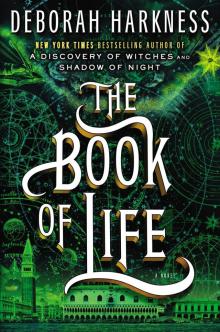 The Book of Life
The Book of Life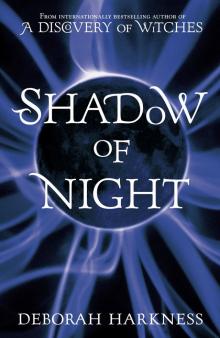 Shadow of Night
Shadow of Night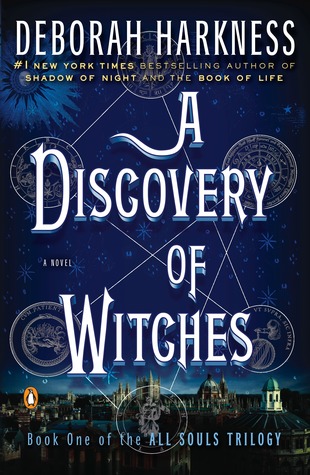 A Discovery of Witches
A Discovery of Witches The All Souls Real-Time Reading Companion
The All Souls Real-Time Reading Companion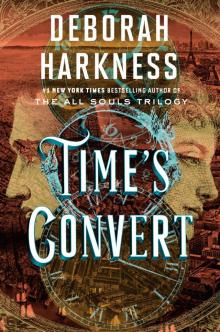 Time's Convert
Time's Convert The World of All Souls
The World of All Souls A Discovery of Witches: A Novel (All Souls Trilogy)
A Discovery of Witches: A Novel (All Souls Trilogy)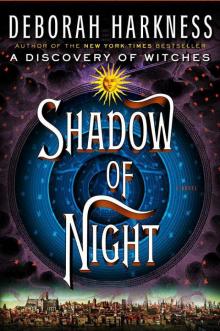 Shadow of Night: A Novel
Shadow of Night: A Novel